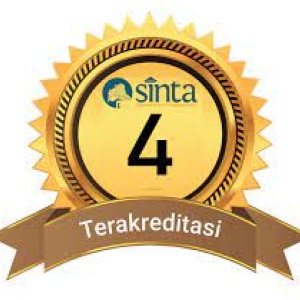Etika Islam dalam Naskah Petikan Qur'an Katut Adab Padikana Karya H. Hasan Mustapa
DOI:
https://doi.org/10.37014/jumantara.v12i2.1255Keywords:
Islamic Ethics, Manuscript, Qur'an Katut Adab PadikanaAbstract
This research is entitled Islamic Ethics in the Petikan Qur'an Katut Adab Padikana by H. Hasan Mustapa, a Sundanese manuscript made in 1920 AD. Good relationship between being and God as well as among fellow beings themselves. The purpose of this research is to reveal the verses that show a good relationship between a being and God as well as between the creatures themselves, and to reveal the metaphoric verses in the manuscript. This research method uses the qualitative methods, which seeks to collect data, process and analyze it qualitatively. While the approach used is the Maudu'i interpretation and semiotic theory. Petikan Qur'an Katut Adab Padikana were printed by the Mendakna Committee in 1937 AD after Hasan Mustapa asked for three years before he died to be copied. There are 115 articles consisting of 57 Surah of 356 paragraphs. Starting from the Surah al-Baqarah, to Al-Nass, the explanation uses the van Ophuysena spelling (1907-1947) and the writing process starts from the left corner, namely the verses of the Qur'an then the right corner of the writing of the verses of the al-Qur'an is in the language Latin, and after that the content of the meaning of the verse is explained by using the Sundanese language so that it is easily understood by the people of the Sundanese area.References
Abdullah, Taufiq. Metodologi Penelitian Agama. Diedit oleh Rush Karim. Yogyakarta: Tiara Wacana. 1989.
al-Farmawi, Abd al-Hayy. aI-Bidayah fi al-Tafsir al-Maudu'i. Kairo: Matba'ah al-Hadarah al-`Arabiyah. 1977.
al-Ghazali, Abu Hamid. Bidayatul Hidayah. Beirut: Dar al-Manhaj. 2004.
al-Ghazali, Abu Hamid. Tuntunan Mencapai Hidayah Ilahi. Diterjemahkan oleh M. Fadlil Sa'd An-Nadwi. Surabaya: al-Hidayah. 1998.
al-Haashimy, Ahmad. Jawaahir al-Balaaghah fii al-Ma'aany wa al-Bayaan wa al-Bady'. Jakarta: Maktabah Daar Ihyaa' al-Kutub al-`Arabiyyah. 1990.
Anwar, Rosihon. Ulum Al-Qur'an. Bandung: Pustaka Setia. 2007.
Arikunto, Suharsimi. Prosedur Penelitian. Jakarta: Rosdakarya. 1997.
Badawy, Ahmad. Min Balaaghah al-Qur'an. Kairo: Daar Nahdhah. 1950.
Baqir, Muhammad. "Pendekatan Tematik Terhadap Tafsir AI-Qur'an." Ulumul Qur'an 1, no. 4 (1990).
Durkheim, Emile. Sosiologi dan Filsafat. Jakarta: Erlangga. 1989.
Giddens, Antony. Kapitalisme dan Teori Sosial Modern. Jakarta: UI Press. 1985.
Gusmian, Islah. Khazanah Tafsir Indonesia, dari Hermeneutika hingga Ideologi. Bandung: Mizan. 2003.
Jahroni, Jajang. The Life and Mystical Thought of Haji Hasan Mustafa (1852-1930). Tesis, Leiden: Leiden University. 1999.
Kartini, Tini, dkk. Biografi dan Karya Pujangga Haji Hasan Mustapa. Jakarta: Pusat Pembinaan dan Pengembangan Bahasa Depdikbud Jakarta. 1985.
Katsir, Ibn. Tafsir al-Qur'an al-Adzim, Juz. 3. Tk: Dar Tana' li Nashr. 1460.
Keraf, Gorys. Diksi dan Gaya Bahasa. Jakarta: PT Gramedia Pustaka Utama. 2004.
Laashyn, Abd al-Fattaah. Al-Bayaan fii Dawi Asaalyb al-Qur'an. Kairo: Daar al-Ma`arif. 1985.
Laffan, Michael Francis. Islamic Nationhood and Colonial Indonesia, The Umma Below the Winds. London: Routledge Curzon. 2003.
Lubis, Nina H. Kehidupan Menak Priangan 1800-1942. Bandung: Pusat Informasi Kebudayaan Sunda. 1998.
Moriyama, Mikihiro. Semangat Baru: Kolonialisme, Budaya Cetak dan Kesastraan Sunda Abad ke-19. Diterjemahkan oleh Suryadi. Jakarta: KPG. 2005.
Muhdlor, Ahmad Zuhdi dan Atabik Ali. Kamus al-'Ashry Indonesia. Yogyakarta: Yayasan Ali Maksum. 1996.
Mustapa, Haji Hasan. Adat Istiadat Sunda. Diterjemahkan oleh M. Maryati Sastrawijaya. Bandung: Alumni. 2010.
Mustapa, Haji Hasan. Petikan Qoer'an Katoet Adab Padikana, diurus djeung diatur ku Comite. Bandung: Droek Boehron Bd. 1937.
Rohmana, Jajang A. "Memahami Al-Quran dengan kearifan Lokal: Nuansa Budaya Sunda dalam Tafsir al-Qur'an berbahasa Sunda." Journal of Qur'an and Hadith Studies 3, no. 1 (2014).
Rohmana, Jajang A. "Memahami Makna Batin Kitab Suci : Tafsir Quranuladhimi Haji Hasan Mustapa (1852-1930)." Jurnal Al-Qalam 32, no. 1 (Januari-Juni 2015).
Rohmana, Jajang A. "Sastra Sufistik Sunda dan Peneguhan identitas Islam Lokal:Kontribusi Dangding Haji Hasan Mustapa (1852-1930)." Jurnal UIN Suska. n.d.
Roifa, Rifa, Rosihon Anwar, dan Dadang Darmawan. "Perkembangan Tafsir Di Indonesia (Pra Kemerdekaan 1900-1945)." Jurnal Al-Bayan: Jurnal Studi Al-Qur'an dan Tafsir 2, no.1 (Juni 2017).
Rosidi, Ajip. Haji Hasan Mustapa Jeung Karya-Karyanya. Bandung: Pustaka. 1989.
Rosidi, Ajip. "Menjejaki Karya-karya Haji Hasan Mustapa." Dalam Warisan Intelektual Islam Indonesia Telaah atas Karya-Karya Klasik, Diedit oleh Ahmad Rifa'i Hassan. Bandung: Mizan. 1992.
Salahudin, Asep. "Suluk Haji Hasan Mustapa." Pikiran Rakyat, Oktober 18. 2009.
Salahudin, Asep. Sesi wawancara dengan Wakil Rektor Dr. H. Asep Salahudin Kampus Suryalaya Tasikmalaya (18 November). 2020.
Satjadibrata, R. Kamus Basa Sunda. Jakarta: Kiblat. 2005.
Sudarto. Metodelogi Penelitian Filsafat. Jakarta: Raja Grafindo Persada. 1997.
Sugiyono. Metode Penelitian Kuantitatif, Kualtatif dan R&D. Bandung: Alfabeta. 2009.
Suplemen Ensiklopedi Islam Jilid 1. Cet. 9. Jakarta: PT. Ichtiar Baru van Hoeve. 2003.
Suryabrata, Sumadi. Metodelogi Penelitian. Jakarta: Raja Grafindo Persada. 1998.
Suseno, Franz Magnis. Etika Umum: Masalah-masalah pokok Filsafat moral. Yogyakarta: Kanisius. 1975.
Zimmer, Benjamin G. "Al-'Arabiyyah and Basa Sunda: Ideologies of Translation and Interpretation among the Muslims of West Java." Studia Islamika. 2000.
Downloads
Published
Issue
Section
License
Copyright (c) 2021 Jumantara: Jurnal Manuskrip Nusantara

This work is licensed under a Creative Commons Attribution-ShareAlike 4.0 International License.
- This statement is the author's commitment to respect copyright, both in terms of citing other people's work and utilizing journal content. If necessary, the author can send an Authenticity Statement of Article stating that "this work is the author's original idea and has never been sent to another publisher and published in any publication"
- The author retains copyright.
- The moral rights of publication belong to the author.
- Formal legal aspects in the use of journal publications refer to the Creative Commons Attribution-ShareAlike 4.0 (CC BY-SA) license, which means that journal content can be used freely for any purpose.










